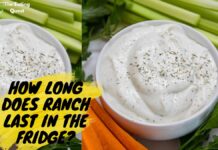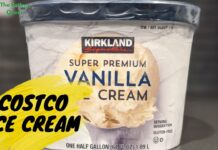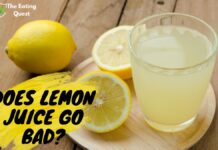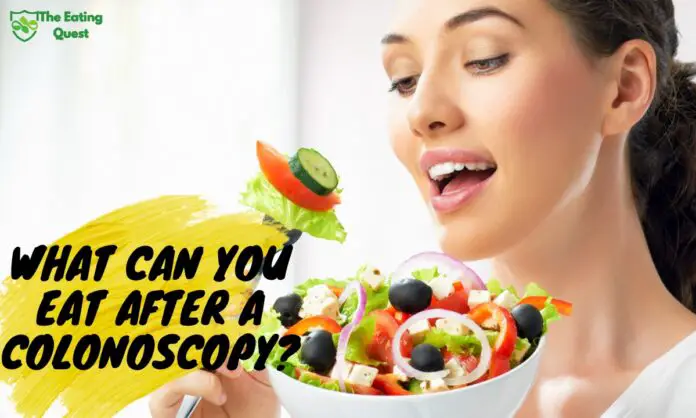You must be mindful of What Can You Eat After a Colonoscopy to ensure a smooth recovery. Your doctor will likely provide specific instructions based on your situation, but some general guidelines exist.
One priority after a colonoscopy is to rehydrate, so drink plenty of water and other fluids. It’s also a good idea to start with light, easy-to-digest foods like soup or applesauce before gradually reintroducing more solid foods. Your doctor may recommend avoiding certain foods, such as raw vegetables or high-sugar desserts, for some time after your procedure.
Overall, a healthy, balanced diet is important for colon health and can help prevent the need for future screenings. Talk to your doctor or a registered dietitian for personalized recommendations on eating after a colonoscopy and maintaining a colon-healthy diet.
What Can You Eat After a Colonoscopy?
What Can You Eat After a Colonoscopy? eating foods that are easy to digest and gentle on your digestive system is essential. Here are some categories of foods that you can eat after your colonoscopy:
Low-Fiber Foods
Low-fibre foods are an excellent choice for the first few days after a colonoscopy. These foods are easy to digest and won’t cause cramping or abdominal pain. Some low-fibre foods you can eat include:
- Cooked vegetables like carrots or beans
- White bread or crackers
- Rice
- Mashed Potatoes or baked
- Applesauce
- Pudding
- Yogurt
- Smooth nut butter
High-Fiber Foods
After a few days, you can reintroduce high-fiber foods into your diet. High-fiber foods help keep your digestive system healthy and can prevent colon polyps and cancer. Some high-fiber foods you can eat include:
- Whole grains like brown rice or whole wheat bread
- Fruits (without seeds) and fruit juices like apple or grape juice
- Cooked vegetables like broccoli or spinach
- Legumes like lentils or chickpeas
- Nuts and seeds (in moderation)
Lean Proteins
Lean proteins are an essential part of your post-colonoscopy diet. They provide the necessary nutrients to help your body recover from the procedure and keep you feeling full for longer. Some lean proteins you can eat include:
- Skinless chicken or turkey
- Whitefish
- Tofu
Soft Foods
Soft foods are an excellent choice for the first few days after a colonoscopy. They’re easy to chew and swallow and won’t cause any discomfort. Some soft foods you can eat include:
- Scrambled eggs
- Pudding
- Gelatin
- Soup (broth-based)
- Smoothies
- Carbonated beverages (in moderation)
Remember to drink plenty of water and clear liquids like herbal tea and vegetable juice to stay hydrated. Avoid dairy products, corn, and carbonated beverages for the first few days after colonoscopy. If you experience any nausea or cramping, try eating smaller, more frequent meals and avoid foods that are hard to digest. Consult your doctor if you have any concerns about your diet or recovery.
Foods to Avoid After a Colonoscopy
After a colonoscopy, eating foods that are easy to digest and gentle on your digestive system is essential. However, there are certain foods that you should avoid to prevent any complications or discomfort. In this section, we will discuss the foods that you should avoid after a colonoscopy.
High-Fiber Foods
High-fiber foods are essential for a healthy diet but can be tough on your digestive system after a colonoscopy. Foods like whole-grain bread, crackers, cereals, raw vegetables, beans, and legumes are high in fiber and can cause bloating, gas, and discomfort. Avoiding these foods for a few days after your colonoscopy is best.
Spicy Foods
Spicy foods can irritate the lining of your colon and cause discomfort, especially after a colonoscopy. Foods like hot peppers, spices, and sauces can cause nausea, bloating, and abdominal pain. It is best to avoid spicy foods for a few days after your colonoscopy.
Fried Foods
Fried foods are high in fat and difficult to digest, especially after a colonoscopy. Foods like chicken fingers, french fries, and fried snacks can cause nausea, bloating, and discomfort. Avoiding fried foods for a few days after your colonoscopy is best.
Crunchy Nut Butters
Crunchy nut butter like peanut butter or almond butter with nuts can be difficult to digest after a colonoscopy. The nuts can cause discomfort and bloating. It is best to avoid crunchy nut butter for a few days after your colonoscopy.
Raw Vegetables
Raw vegetables are high in fiber and can be difficult to digest after a colonoscopy. Vegetables like broccoli, cauliflower, and carrots can cause bloating, gas, and discomfort. Avoiding raw vegetables for a few days after your colonoscopy is best.
In summary, after a colonoscopy, avoiding high-fiber foods, spicy foods, fried foods, crunchy nut butters, and raw vegetables is essential to prevent complications or discomfort. Stick to easy-to-digest foods like lean protein, cooked vegetables, and fruit juices. Remember to drink plenty of water and avoid alcohol, carbonated beverages, and smoking.
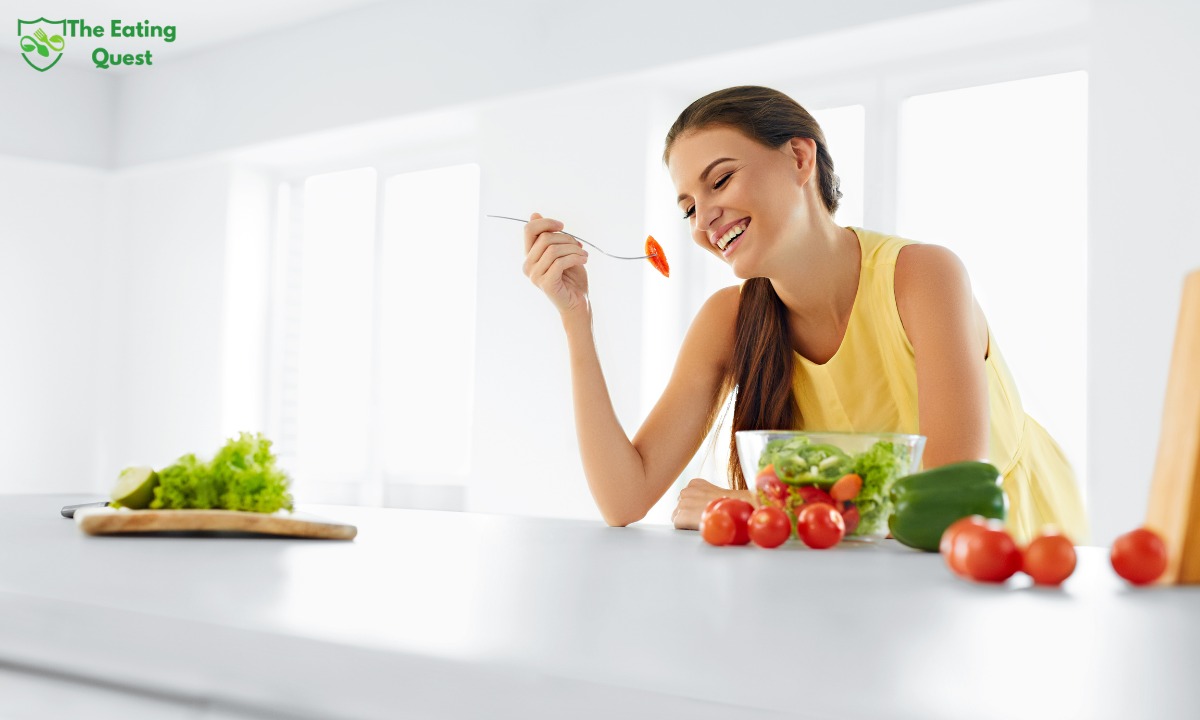
Fluids to Drink After a Colonoscopy
After your colonoscopy staying hydrated and drinking plenty of fluids after your colonoscopy is essential to help your body recover, here are some of the best fluids to drink after a colonoscopy:
Water
Water is the best choice to stay hydrated after a colonoscopy. Drinking water can help replace the fluids lost during bowel preparation and anaesthesia. Aim to drink at least eight glasses of water daily to stay hydrated.
Fruit Juice
Fruit juice is an excellent source of vitamins and minerals to help replenish your body after a colonoscopy. Apple, grape, and cranberry juice are good options. However, avoid fruit juices with pulp or seeds, which can irritate your colon.
Broth
The broth is a good source of electrolytes and can help replace the fluids lost during bowel preparation. Chicken, beef, or vegetable broth are all good choices. However, avoid any broths that contain solid pieces of meat or vegetables.
Sports Drinks
Sports drinks like Gatorade or Powerade are a good source of electrolytes and can help replenish your body after a colonoscopy. However, they can be high in sugar, so choose a low-sugar option.
Herbal Tea
Herbal tea is a good source of antioxidants and can help soothe your digestive system after a colonoscopy. Chamomile, peppermint, and ginger tea are all good options.
Drinking fluids after a colonoscopy is crucial to help your body recover. Water, fruit juice, broth, sports drinks, and herbal tea are excellent choices to stay hydrated and replenish your body.
Conclusion
In conclusion, What Can You Eat After a Colonoscopy? taking care of your digestive system is essential by eating the right foods. You should focus on consuming soft, easy-to-digest foods and drinking plenty of clear liquids until the anesthesia and any sedatives have worn off.
It is recommended to avoid high-fiber foods that cause gas, high-fat foods, spicy foods, and alcohol for at least 24 hours after your colonoscopy. Instead, choose low-fat dairy, lean protein, fruits, vegetables, and whole grains.
It is also important to note that everyone’s body is different, and what works for one person may not work for another. Therefore, listening to your body and adjusting accordingly is crucial.
Following the recommended guidelines and listening to your body’s needs can help your digestive system bounce back after a colonoscopy and promote overall health and well-being.
Also Read:





